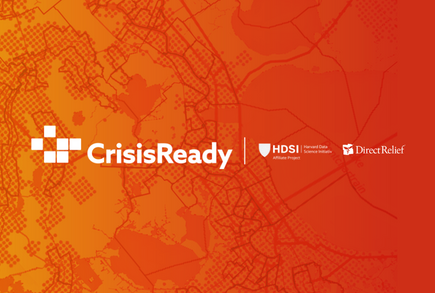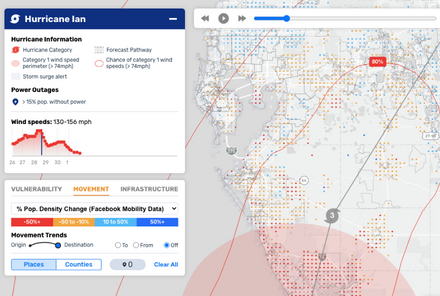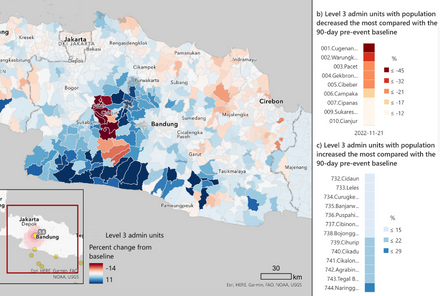21st century technological advances in mobile and cloud based computing, remote sensing and data accessibility, present a range of novel data streams on clinical and population health, on human mobility patterns, on habitat and infrastructure, and on the environment – in near real time – to policy makers and first responders. We advance data-driven decision making in public health emergencies through research, training, and translational interventions.
Projects

CrisisReady.io
CrisisReady is an international research-response platform based at Harvard University and Direct Relief. Co-led by Caroline Buckee, Satchit Balsari, and Andrew Schroeder, the platform’s Data-Methods-Translational Framework allows the CrisisReady team to scale data-driven decision making through a network of regional partners.

CrisisReady ReadyMapper
Our team at CrisisReady has built interactive decision-making tools to help first responders and aid agencies make decisions on mobilization and resource allocation based on near real-time population displacement data. The tool covers a range of disasters, from wildfires in California, to earthquakes in Morocco.

CrisisReady ReadyReports
The CrisisReady team provides daily situation reports (“ReadyReports”) to emergency and humanitarian response agencies around the world, including those responding to the Ukraine war, as well as recent hurricanes, earthquakes and floods.

EMcounter Kumbh Mela
In 2013, Harvard University sent a multi-disciplinary research team of faculty and students with backgrounds in theology, urban planning, public health, and business to study the the Kumbh Mela in India, the world’s largest mass gathering.
Using human-centered design, dynamic data visualization tools, and smart technology, EMcounter has brought state of the art disease surveillance tools to low resource settings. This low-cost intervention has the potential to improve healthcare quality, safety, and accountability at scale.

COVID-19 Mobility Data Network (CMDN)
Led by Caroline Buckee, Professor of Epidemiology and Associate Director of Harvard’s Center for Communicable Disease Dynamics, the COVID-19 Mobility Data Network (CMDN) is a network of infectious disease epidemiologists at universities around the world working with technology companies to use aggregated mobility data to support the COVID-19 response.
Publications
CrisisReady’s novel framework for transdisciplinary translation:
Case-studies in wildfire and hurricane response
January 10, 2023 | The Journal of Climate Change and Health, Volume 9 (2023) 100193
Andrew Schroeder, Caleb Dresser, Akash Yadav, Jennifer Chan, Shenyue Jia, Caroline Buckee, Satchit Balsari
In two case studies, the CrisisReady team describes how they have negotiated access to privately-held data sources, such as anonymized geolocation data from cellphones, while striking a balance between data security and public health utility.
Location Data in the Context of Public Health, Research, and Law Enforcement:
An Exploration of Governance Frameworks
August 23, 2022 |National Academies of Sciences, Engineering, and Medicine
Professor of Epidemiology at Harvard T.H. Chan School of Public Health Caroline Buckee co-organized a virtual workshop with the National Academies of Sciences, Engineering, and Medicine‘s Committee on Science, Technology, and Law on how location data can be used in public health, research, and law enforcement.
This report provides an overview of the proceedings that took place during the workshop.
The Use of Human Mobility Data in Public Health Emergencies
April 9, 2022 | CrisisReady.io
Caroline Buckee, Andrew Schroeder, Jennifer Chan, Satchit Balsari
This white paper summarizes key learnings from a four-part seminar, “Safe, Fair, Equitable and Responsible Use of Human Mobility Data,” which identified the technical, regulatory, and translational gaps that preclude the effective integration of novel data into disaster response.
Data in Crisis: Rethinking Disaster Preparedness in the United States
September 1, 2021 | New England Journal of Medicine, Medicine and Society (2021)
Caroline Buckee, Satchit Balsari, Mathew V. Kiang
Despite the availability of large-scale data on medical needs, population vulnerabilities, physical and medical infrastructure, human mobility, and environmental conditions, the translation of these data and methods into improved disaster response faces substantial challenges.
The authors of this paper discuss these challenges, and argue that a sustained commitment and investment in the necessary data systems, methodological tools, and translational pipelines is required to prepare for the natural disasters facing us.